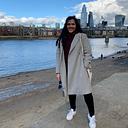Are Millennials Killing The Art of Poetry?
No, we’re not. Poetry has been around for thousands of years and it sure as hell can survive us. But since you’re here, let’s talk about poetry.
Most of you probably began and stopped reading poetry in high school. Maybe a few of you tried your hand at it and came up with something starting with “roses are red, and violets are blue”. But really, how many poets do you know in our generation? We see Tumblr style poetry coming from Rupi Kaur — no judgment there, her writing can be highly relatable, it's just not my thing. Thanks to President Biden’s inauguration we heard some beautiful and powerful spoken word by Amanda Gorman. Sadly, the majority of us would have heard her poem once, loved it, tweeted about it, and then proceeded never to look at poetry again. Unfortunately, there aren’t many other poets who have been able to cross into pop culture, giving us a rather dismal answer of two.
In school, we studied so many of the greats; Walt Whitman, Edgar Allen Poe, Emily Dickinson, Robert Frost, William Blake, T.S Eliot, Oscar Wilde, among others. So many of us read their poetry but now never read it as adults when finally have a chance of understanding it. As teenagers, we all assumed we knew enough about the world, and it seems that somewhere along the way we decided poetry could only be about diverging paths, streams, and birds. If only in school we had the chance to read more contemporary pieces by Sylvia Plath and Charles Bukowski. Relatability is dripping off their words; more so for any young adult reader.
Plath draws dark seas full of mental illness and a desire for freedom, while Bukowski shines a spotlight on the obscure moments in the world in which we create our lives. Both poets, though worlds apart in their writing, have the lovely ability to show how relatable and wise poetry is and can be — if we let it. This leads me to my question: why don’t the majority of us see how real and thought-provoking poetry is?
In this day and age, most young adults are fanatics for personal development, self-reflection, and wellness. If we all are truly motivated to pursue these buzz words, then why aren’t we using a tool as old as clocks to help us in our journey? Poetry, when read with an open mind, is a great storytelling form where truths of the universe seem so simple and human in their own way. I surely am not the only one who realizes this; but I know I am one of few as poetry sections in bookstores still remain small and tucked away in the back.
The only explanation I have found is that as time has passed, the sentiment that can be called “woke” culture has increasingly shifted us away from enjoying the dying art. Woke culture, at its roots, is the growing awareness of varying issues (most often woke culture is in reference to social justice and racial issues specifically, but just hear me out). As centuries have passed science has given us growing awareness of the world and henceforth focused the once blurred line between reality and myth. With this, it has cleared out space where poetry lives. The history of poetry shows us it was originally a way to tell stories of ancient mythology. With this line clearly distinguished thanks to our new awareness, it becomes easy to cast poetry as fantasy storytelling, with no real relevance. But, we forget that each story runs deep with themes prevalent to every reader. Even “The Epic of Gilgamesh”, one of the earliest surviving pieces of notable literature from ancient Mesopotamia, is overflowing with themes of immortality, death, and relationships.
I’m not telling you to jump straight into some of the most ancient texts in the world. But, I do suggest starting with some of the genius more recent poets whose stories can still strike a chord within you, though their time, too, has passed.
A word of caution, do not try to enjoy poetry without an open mind. Otherwise, you may be fated like those who think Charles Bukowski’s So You Want to Be a Writer? is bullshit, dumb, or a way of gatekeeping writing.
To those who say poetry is bullshit:
You forget what you are reading.
Love and genius not known till the author is long gone.
Plath, Frost, Bukowski, Poe
Each their own pen, each their own journey.
Each a way to describe the plainness of life as a miracle and a death sentence at once.
Poetry is not for the literal minded.
It is for them
the authors, the dreamers,
the romantics, the willful, the soulful,
those who think music bleeds in color,
and clouds are painted deliberately.
If you do not remember how to be a child;
then you cannot read poetry.
Originally published at https://www.elinaagrawal.com on February 8, 2021.
